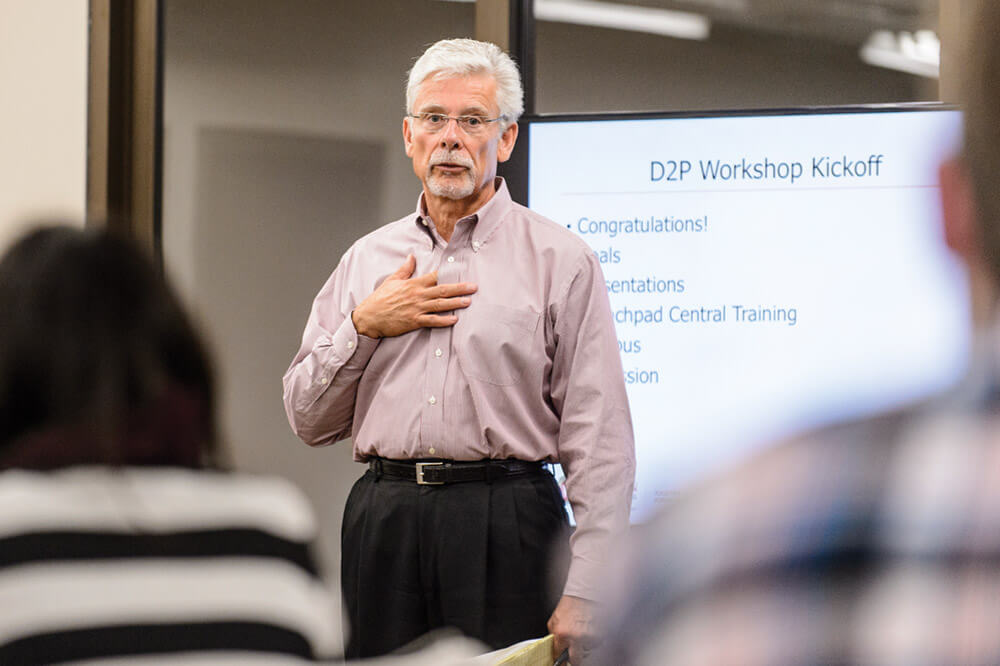From Wisconsin Ideas to Global Products

John Biondi, director of D2P, welcomes UW researchers to a workshop in September. D2P announced that it would support fifteen projects, helping researchers take their discoveries and inventions to the marketplace. Those projects include technologies to enable affordable 3-D color printing, tools for cancer detection and imaging, and a method for rapidly propagating stem cells. Photo: Bryce Richter
A new effort guides entrepreneurs from campus to commercialization.
For UW faculty and students with innovative aspirations, a new gateway to the marketplace has opened in the heart of campus. In less than a year, Discovery to Product (D2P) has grown from an idea into an initiative dedicated to supporting tech transfer and turning UW research into marketable products.
“The goal is to develop scalable and sustainable business models that can either be the basis for forming licensing agreements around technologies or forming start-up companies and getting those companies funded,” says D2P director John Biondi.
In August, D2P announced the first fifteen projects it will fund, and D2P staff will also work with two additional teams that have technologies already close to commercialization. The projects encompass a wide range of disciplines and topics, including technologies to enable affordable 3-D color printing, new tools for cancer detection and imaging, and a method for rapidly propagating billions of stem cells.
Each research team will receive a portion of D2P’s $2.4 million in UW funds earmarked by the State of Wisconsin for economic development. D2P will also help entrepreneurs learn how to match their products with customer realities. Biondi says performing this market de-risking before taking products out of the university can help put innovators in a stronger position to start companies or seek out licensing agreements.
“Hopefully by [allowing] these projects to progress within the boundaries of the university, we can mature them so that when they do become companies, their probability of success will be much higher and their path to success will be much faster,” he says.
D2P is the culmination of three years of planning and development spearheaded by former Provost Paul DeLuca and Carl Gulbrandsen PhD’78, JD’81, managing director of the Wisconsin Alumni Research Foundation, along with a core team of university administrators. When Chancellor Rebecca Blank began her tenure in 2013, she expressed immediate interest in moving D2P forward.
Animal science professor and entrepreneur Mark Cook, who chairs the D2P advisory board and has been closely involved from the beginning, says the initiative helps to close a gap in campus resources. “If you [came] up with a good idea, there was not a vehicle for really developing that innovation to a point where you could determine whether that idea was commercially viable,” he says.
Though commercialization success will look different for each project, Biondi and Cook anticipate that D2P innovators will eventually establish several in-state companies. “The fundamental notion here is that by taking projects from the university and then bringing them out to the commercial world here in Wisconsin, more of them will stay here in Wisconsin,” says Biondi. “That’s our hope.”
Cook agrees, adding that start-up opportunities could also help Wisconsin retain the highly skilled workforce educated and trained at the UW. “If we’re not creating the job opportunities to keep them in the state, not only are we losing the innovations, we’re also losing the people,” he says. “If the ability to transfer technology benefits the state and creates jobs, and there is some kind of return [to the university] in the form of patents, then we all benefit in the process.”
Published in the Winter 2014 issue



Comments
No comments posted yet.